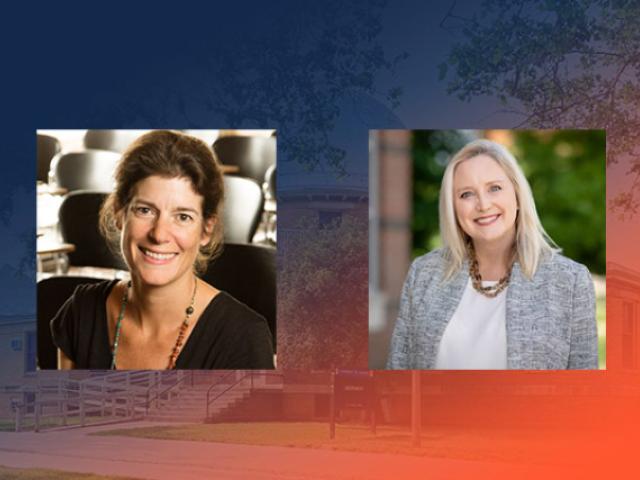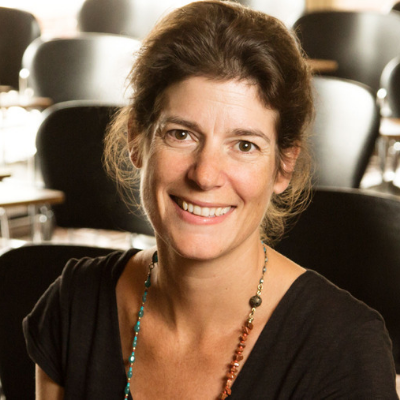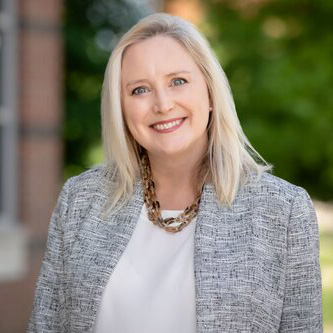New leadership and increased visibility add up to a defining moment for CSBS

During the height of the pandemic, U.S. researchers worked around the clock to roll out a vaccine in record time. It was a triumph of scientific achievement – one capable of preventing serious illness and slowing the spread of COVID – yet nearly half of eligible Americans chose not to get a vaccine in the first nine months of availability.
The lukewarm reception puzzled many life scientists, but social and behavioral scientists, like Eva Pomerantz who leads the Center for Social and Behavioral Sciences (CSBS) at the University of Illinois Urbana-Champaign, were not surprised.

“The impact of many of the advances coming out of engineering and medicine, as well as biology and other science fields, can’t be fully realized unless you understand what leads people to embrace the advances,” said Pomerantz, a professor of psychology who became CSBS director earlier this year. “Since the pandemic, I think the world has started to more fully realize that social and behavioral science is necessary in solving some of our most pressing problems.”
While it may have taken a health crisis to shine a global spotlight on the importance of understanding human behavior, UIUC leadership had already leveled up its investment in social and behavioral science two years earlier, as part of the Next 150 Strategic Plan. It was from that plan that CSBS became a reality in 2019.
The center leverages social and behavioral science expertise across campus to focus on what Pomerantz calls “societal grand challenges”. For example, the small grant program funds research that addresses inequity and poverty; the intersection of society, human behavior, and the digital revolution; and social and behavioral determinants of health. Gaining traction in addressing these issues, as well as others facing society, requires a focus on interdisciplinary collaboration and public engagement.
"...Since the pandemic, I think the world has started to more fully realize that social and behavioral science is necessary in solving some of our most pressing problems." - Eva Pomerantz, CSBS Director

That’s where Brenda Koester comes in. Koester, who became CSBS’s associate director in July, brings to her new role 16 years of campus experience in transdisciplinary research and outreach education. She said the moment is ripe for increasing the capacity of the center’s reach and impact.
“One of the things I’m really excited about right now is the enormous interest other transdisciplinary centers on campus have in collaborating,” said Koester. “For instance, we recently held a summit with iSEE [Institute for Sustainability, Energy, and Environment], and are in the planning stages of launching a collaboration with the Cancer Center at Illinois. Together, we can make an even bigger impact on real challenges to society.”
“One of the things I’m really excited about right now is the enormous interest other transdisciplinary centers on campus have in collaborating...together, we can make an even bigger impact on real challenges to society.” - Brenda Koester, CSBS Associate Director
The Small Grant Program is another way CSBS encourages interdisciplinary researchers to connect and develop innovative, big-impact projects that ultimately attract external funding. To date, the program has awarded $890,158 to 46 research teams, 120+ researchers spread across 40+ campus units and all 14 colleges/schools, resulting in a 12.2:1 return on investment ($10.8 million in external funding).
Other key CSBS initiatives include the Science and Society Initiative, which helps scientists to communicate and connect with a wider audience – and ultimately, secure research funding. Another is the Policy and Research Legislative Fellows Program, which matches graduate students with state legislators to collaborate on a policy research projects that improve life in Illinois.
CSBS has also just welcomed a community engagement specialist to the team: Paige Duncan, who was previously STEAM director at the Martens Center in North Champaign. In her new role with CSBS, Duncan will continue to bring science to youth at the Martens Center, but now that programming will come directly from campus centers and institutes, including CSBS, the Beckman Institute, the Cancer Center, the Institute for Sustainability, Energy, and the Environment, and the National Center for Supercomputing Applications.
Susan Martinis, Vice Chancellor for Research and Innovation at UIUC, said the center’s focus on bridging the local community and campus are critical to the university’s mission.
“Social and behavioral scientists are a vital part of university’s research enterprise, especially as we focus on impact in our community and state,” said Martinis. “CSBS is also a driver of ambitious, groundbreaking research on our campus by bringing together faculty who might not otherwise collaborate. That’s where innovation happens.”
Learn more about the center’s many programs and subscribe to their newsletter to stay connected.
Kristin Tennant, OVCRI Director of Research Communications
Oct 06, 2023